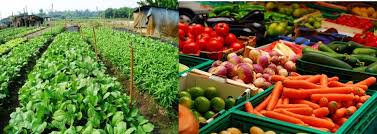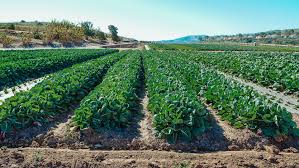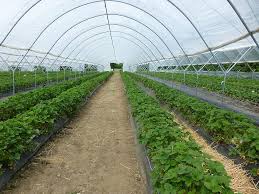| How to Start a Profitable
Vegetable Farm in Nigeria
The practice involves the cultivation of various types of
vegetables, including leafy greens, root crops, legumes, and
other vegetables that are commonly used in different cultures.
 Nigeria
is one of the largest producers of vegetables in Africa, with
over 1.9 million hectares of land used for vegetable farming.
The country’s top vegetable-producing states include Lagos,
Kano, Kaduna, Plateau, and Oyo. The country is also a
significant exporter of vegetables, with over $35 million worth
of vegetables exported annually. Globally, vegetable farming is
a fast-growing industry, with the global vegetable seed market
expected to reach $11.44 billion by 2027. Nigeria
is one of the largest producers of vegetables in Africa, with
over 1.9 million hectares of land used for vegetable farming.
The country’s top vegetable-producing states include Lagos,
Kano, Kaduna, Plateau, and Oyo. The country is also a
significant exporter of vegetables, with over $35 million worth
of vegetables exported annually. Globally, vegetable farming is
a fast-growing industry, with the global vegetable seed market
expected to reach $11.44 billion by 2027.
In recent years, there has been a growing demand for organic
vegetables due to their perceived health benefits, and this has
opened up new opportunities for vegetable farmers in Nigeria and
Africa. With the increasing demand for organic vegetables, there
is a growing market for organic vegetable exports, providing an
opportunity for farmers to increase their income and contribute
to the economic development of their countries.
 The
planting and harvesting seasons for vegetables in Nigeria and
Africa vary depending on the type of vegetable and the
geographical location. Generally, vegetables are planted during
the rainy season when the soil is moist and conducive for plant
growth. The planting season for most vegetables is between March
and June, while the harvest season starts between June and
November. The
planting and harvesting seasons for vegetables in Nigeria and
Africa vary depending on the type of vegetable and the
geographical location. Generally, vegetables are planted during
the rainy season when the soil is moist and conducive for plant
growth. The planting season for most vegetables is between March
and June, while the harvest season starts between June and
November.
 However,
some vegetables such as tomatoes, cabbage, and onions can be
grown during the dry season, which is between November and
March, using irrigation techniques. These vegetables are grown
in areas with reliable access to water and adequate irrigation
facilities. Additionally, greenhouse farming has become
increasingly popular for vegetable production, as it allows for
year-round cultivation regardless of the season. However,
some vegetables such as tomatoes, cabbage, and onions can be
grown during the dry season, which is between November and
March, using irrigation techniques. These vegetables are grown
in areas with reliable access to water and adequate irrigation
facilities. Additionally, greenhouse farming has become
increasingly popular for vegetable production, as it allows for
year-round cultivation regardless of the season.
 You
can target students, supermarkets, restaurants and caterers as a
beginner. One thing must be certain, you must be constant
because this set of people do not like disappointment. You
can target students, supermarkets, restaurants and caterers as a
beginner. One thing must be certain, you must be constant
because this set of people do not like disappointment.
Choosing the Right Location:
One of the first and most important decisions will be
identifying the right location for your vegetable farm. The
ideal location should have: Fertile land with good drainage and
access to water for irrigation, Suitable climate and temperature
for the vegetables you want to grow, Close proximity to your
target market or transport links if further away, Access to
labour and any other services/infrastructure required
 Some
of the best regions for vegetable farming in Nigeria include
Plateau, Kaduna, Oyo, Ogun, Osun, Edo, Delta, and Rivers State.
Proximity to major cities like Lagos, Abuja, Port Harcourt,
Kano, and Onitsha is recommended since this provides easy market
access. Some
of the best regions for vegetable farming in Nigeria include
Plateau, Kaduna, Oyo, Ogun, Osun, Edo, Delta, and Rivers State.
Proximity to major cities like Lagos, Abuja, Port Harcourt,
Kano, and Onitsha is recommended since this provides easy market
access.
Drying: After blanching, the vegetables should be dried to
remove excess moisture. This can be done by spreading them out
on a clean, dry surface or using a salad spinner.
 Packaging:
Once the vegetables are dried, they can be packaged. The
packaging should be designed to protect the vegetables from
damage and to keep them fresh for longer. Vacuum-sealed bags,
plastic containers, or airtight bags are some of the common
packaging options. Packaging:
Once the vegetables are dried, they can be packaged. The
packaging should be designed to protect the vegetables from
damage and to keep them fresh for longer. Vacuum-sealed bags,
plastic containers, or airtight bags are some of the common
packaging options.
 Labeling:
Proper labeling is important to inform consumers about the
contents of the package. The label should include the name of
the vegetable, the date of processing, and any other relevant
information such as the farm of origin and the nutritional
value. Labeling:
Proper labeling is important to inform consumers about the
contents of the package. The label should include the name of
the vegetable, the date of processing, and any other relevant
information such as the farm of origin and the nutritional
value.
Processing and packaging vegetables in Nigeria and Africa
requires specific equipment to ensure the products are properly
cleaned, sorted, processed, and packaged. Some essential
equipment for processing, packaging, and supplying vegetables in
Nigeria and Africa include: This includes knives, shears, and
harvest baskets for collecting the vegetables from the farm.
Washing Tanks, Grading Machine, Cutting Machine, Drying Machine,
scales, bagging machines, and sealing machines used to package
and seal vegetables in bags or containers. Refrigeration and
Storage Equipment, Transportation Equipment. It is essential to
maintain and regularly service the equipment to ensure that they
are in optimal condition for efficient processing and packaging
of vegetables.
 A
one hectare of cucumber farm can yield over 1,000 bags of fresh
cucumbers. A bag of fresh cucumbers weigh about 40 kg and it is
sold for ₦3,000. The price of a bag of fresh cucumbers in
Nigeria can go as high s ₦7,000 in the lean period. To earn good
money from cucumber farming, you will need to use drip
irrigation, specialized fertilizers and quality farm inputs. Do
not cut corners. A
one hectare of cucumber farm can yield over 1,000 bags of fresh
cucumbers. A bag of fresh cucumbers weigh about 40 kg and it is
sold for ₦3,000. The price of a bag of fresh cucumbers in
Nigeria can go as high s ₦7,000 in the lean period. To earn good
money from cucumber farming, you will need to use drip
irrigation, specialized fertilizers and quality farm inputs. Do
not cut corners.
 Okra:
Okra is one of the 3 months crops in Nigeria. It reaches
maturity within 40 days. Farmers cultivating okra in Nigeria can
start harvesting fresh okro within 35 – 45 days. Okra is mainly
used for the preparation of food in Nigeria. Like other 60 days
and 90 days crops in Nigeria, okra farming can be very
lucrative. It is not uncommon to see farmers earning over 100%
Returns on Investment (ROI) on okra cultivation. Okra:
Okra is one of the 3 months crops in Nigeria. It reaches
maturity within 40 days. Farmers cultivating okra in Nigeria can
start harvesting fresh okro within 35 – 45 days. Okra is mainly
used for the preparation of food in Nigeria. Like other 60 days
and 90 days crops in Nigeria, okra farming can be very
lucrative. It is not uncommon to see farmers earning over 100%
Returns on Investment (ROI) on okra cultivation.
 Cost
and profit analysis of 3 months crops in Nigeria Cost
and profit analysis of 3 months crops in Nigeria
Cucumber: With N500,000, you can cultivate an acre of cucumber
with drip irrigation. The profit on one acre of cucumber can be
as high as N1 million
Okra: N350,000 can be used to cultivate an acre of okro if you
use drip irrigation. The profit can be twice or thrice the cost
of setting up the farm.
Ugwu: The cost of growing Ugwu can be as low as N50,000
depending on the size of the farm. The profit can be twice the
cost of setting up the farm.
Ewedu: Ewedu is most
profitable in the dry season. The cost of growing ewedu is
usually low and the profit can be very high.
 Profits
in Vegetable Farming Business Profits
in Vegetable Farming Business
Profits depend on the type of vegetables you are farming and the
space used. But any commercial vegetable farming is profitable.
10 beds of sizable ugu beds can give you #80,000 every week.
Imagine investing N100,000 into either ugu, cucumber, okra, or
cabbage commercial farming and see how your life turns around.
 Starting
a profitable vegetable farming business in Nigeria requires
thorough planning, commitment and effective execution. With
adequate preparation and management, significant incomes and
even export-level success are attainable. Carry out extensive
research, select viable locations, develop robust sales
channels, leverage financing options and manage operations
judiciously. Over time, reinvest to scale up and diversify for
maximum benefit. Starting
a profitable vegetable farming business in Nigeria requires
thorough planning, commitment and effective execution. With
adequate preparation and management, significant incomes and
even export-level success are attainable. Carry out extensive
research, select viable locations, develop robust sales
channels, leverage financing options and manage operations
judiciously. Over time, reinvest to scale up and diversify for
maximum benefit.
How to start a profitable
Vegetable farming Business in Nigeria.
The body of this work is formed from consulting
experienced and relevant people running the Vegetable
farming Business, to get first-hand information about
the success secrets and marketing strategies deployed to
achieve business success.
Click here to fill our application form:
https://forms.gle/jt7DaqkmobimT5PX8
One on one practical training with ongoing support
from our resource person. Well-crafted training
initiatives aim to close skill gaps, thus boosting
individual performance. The success of this program
reflects our shared commitment to creating a better
future for our participants The trainees are evaluated
at the end of the training period to ascertain the
reliability of such training so as to assist in the
provision of necessary instrument needed for starting
the business or trade. Training is built on an active,
experimental and practical learning sessions. Our expert
advice is unique, actionable, and impossible to
replicate. No one else can provide the tailored insights
we offer, designed specifically for your success
.Imagine having a roadmap tailored just for you, guiding
you step by step toward your
career goals. Attendees will receive certificate
of participation at the end of the Training
Click here to fill our application form:
https://forms.gle/jt7DaqkmobimT5PX8 |
|
Our motivation is to see every Nigerian benefit from our
Unique Income opportunity, specially focused towards a
sustainable, entrepreneurial, and innovative future by
connecting them to new ideas and skills
Browse through our highly resource information
over 500 Business ideas.

|
|
This guide is designed to help business people including Micro,
Small and Medium Scale Entrepreneurs navigate the legal and
regulatory considerations relevant to starting-up and doing
business in Nigeria.CLICK HERE |
Creating
multiple streams of income can be a strong way to improve
your personal finances. Whether you’re trying to boost your
savings or build toward a goal, this is a move that many of
the most financially successful Nigerians make.CLICKHERE |
|
© All rights reserved 2024. 21st Strategies Consulting Nigeria
|
![]()







